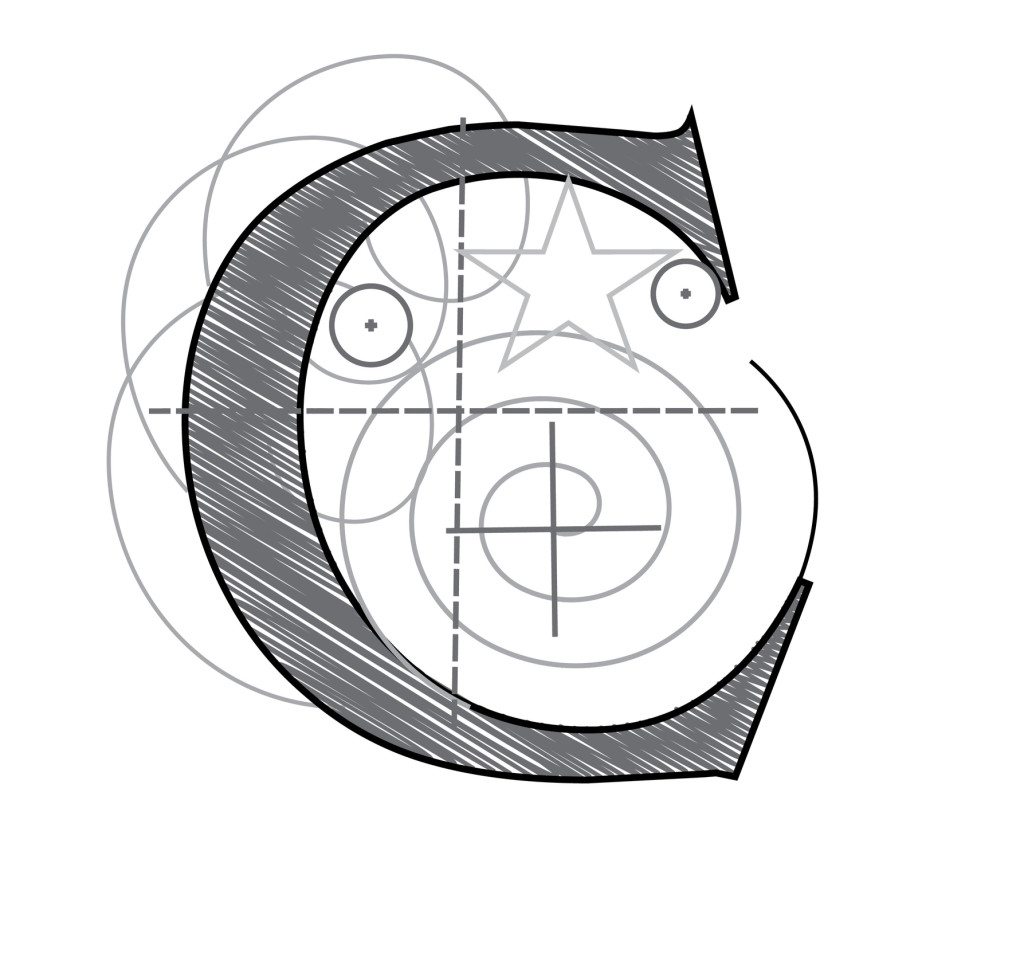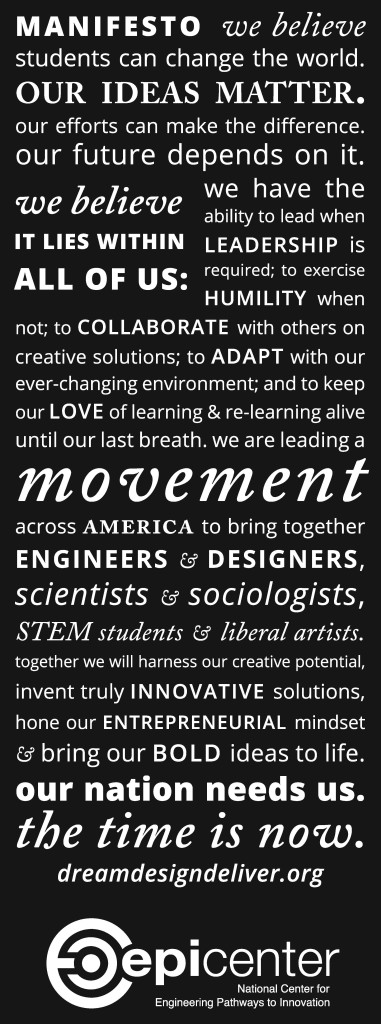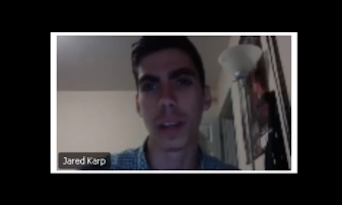Create Something Every Day: A Guide to Becoming a Producer
By Elliot Roth
 CREATORS CREATE to
CREATORS CREATE to
hone their CREATIVITY.
Engineers are artists. The best of them are making something everyday to exercise their creativity and problem-solving abilities. But, all too often intention is overshadowed by procrastination.
Everyone is guilty of procrastination. It’s easy to promise yourself that you’ll do something but it’s a different matter to actually do it; that’s why gym membership purchases increase after New Year’s. That’s why so many entrepreneurs are starters rather than finishers. However, there is a way to become a finisher, and it starts with a few key steps.
Put yourself on an information diet
It’s 9 p.m. on a Sunday night as I sit down to write a paper at my computer. I jot down the first sentence, then check Facebook to see if my friend has responded to my most recent message. Three hours later, I’ve still got one sentence and I’m watching Harlem Shake videos.
When the entire world is at your fingertips, you can lose yourself for days in mindless junk. Distractions are endless, and while you gorge yourself on information, your bloated mind is drained of the motivation to create. Deadlines keep piling up, you’re always rushing everywhere, and you’re stressed and drained at the end of the day. That is the way your brain feels when you only consume information.
 Turn off your phone. Turn off your internet. The best way to keep yourself honest is to have a way to keep track of the days you produce content. This could either be a distinct schedule, or a calendar that you cross off as you go. The trick is to be accountable to someone other than yourself. If you’re accountable to a calendar, a deadline, or a certain amount of time at a certain hour, you are more likely to succeed.
Turn off your phone. Turn off your internet. The best way to keep yourself honest is to have a way to keep track of the days you produce content. This could either be a distinct schedule, or a calendar that you cross off as you go. The trick is to be accountable to someone other than yourself. If you’re accountable to a calendar, a deadline, or a certain amount of time at a certain hour, you are more likely to succeed.
As an entrepreneur, you’ll see leaps forward if you pick a specific time each day to work on your project. Many articles state successful people take a couple hours in the morning to start their day with creating. The trick is to wake up and immediately begin so that you start your day out on a positive note by creating value.
Consuming without producing anything of value is a waste of resources. Consumption should have meaning. Each bit of information you take in should lead you to new ideas. New ideas stimulate a snowball effect, through which you gain greater insight and knowledge. Without the outlet of creation, the knowledge you gain stagnates and eventually evaporates. The best way to work out your mind is to make something.
Do something. Do anything. Just get started.
This mantra has been especially helpful to me in writing. The best advice I ever got about how to write was simply: “Write every day.”
While that may seem daunting at first, particularly if you don’t have a good idea, it is far better to do something than nothing at all. The minute pencil touches paper, thoughts become reality and you immediately discover ideas that you would never have realized without starting to create. The same holds true for any discipline. Write, draw, doodle, craft, play. These simple “paper prototypes” allow you to begin finding new knowledge.
Don’t worry if it doesn’t look perfect. Something is always better than nothing. Yoda and his crazy green Jedi knowledge are dead wrong. The truth is, most effort ends in failure. Despite this fact, amazing things happen when people try.
A problem that many wannabe entrepreneurs face is that they begin many projects, but don’t follow them through to completion. The reason they don’t succeed is because they aren’t consistent.
Consistently improve
When I was in 11th grade, my friend Dan got an award for attendance. It turns out that he had missed a single day of school in 11 years (he’d had the flu). He was top of the class and got in to a prestigious school with a full ride scholarship.
Dan illustrates the rewards of consistency. By going to school every day, Dan learned and practiced far more than his fellow classmates. Attending class became a habit, so much so that when senior year rolled around, he didn’t skip a single class.
Consistency favors sustainability over speed. If you’re going to dedicate yourself to becoming an entrepreneur, you must think on a larger timescale. Begin building positive habits early so that they become a part of you. The most important thing to remember is to strive to improve consistently. Bill Gates improved Microsoft consistently as a CEO.

A side benefit of consistency is that people will be more honest with you about your work. It’s far easier to tell someone that their baby is ugly if they are going to make another one tomorrow. Honest feedback leads to dramatic improvement and stronger relationships. It is much harder to be honest with yourself.
This past April, I tried to write a poem every day for National Poetry Writing Month (NaPoWriMo). Thirty poems in thirty days is a HUGE challenge. At first, I was very dedicated and stayed up late writing. But then I started to slack. After missing a day or two, I couldn’t keep up and quit halfway through the month.
There were a few key elements missing in how I went about this gargantuan task. Primarily, I failed to develop a routine. I was continually distracted by “more important” things, and cared more about the outcome than the process. I wasn’t able to delay gratification in order to create something of value.
Delay gratification
 In 1970, a Stanford experiment conducted by a psychologist Walter Mischel tested children on their ability to delay gratification. He placed a marshmallow in front of them and told them that they could eat it, but if they waited they could have a second one. The amazing results showed that the children who could delay gratification were much more successful later in life than their counterparts.
In 1970, a Stanford experiment conducted by a psychologist Walter Mischel tested children on their ability to delay gratification. He placed a marshmallow in front of them and told them that they could eat it, but if they waited they could have a second one. The amazing results showed that the children who could delay gratification were much more successful later in life than their counterparts.
Long-term rewards are arguably better than short-term rewards. However, it is difficult to see the steps involved in getting to the end result. The best way to achieve is to be consistent in your work. Produce something simple and easy every day and you will get closer and closer to your goal.
Practice makes permanent
Producing content on a regular basis leads to many valuable things. At first everything you make seems terrible. Don’t despair. Over time, you’ll improve your skills as you learn through producing. You get comfortable with making new things. All this practice will enable you to hone your skills, so that when you have an epic idea, nothing can stop you.
The more you put out into the world, the more you receive. However, beware of sharing your small successes. Recent studies have shown that if you share what you are working on, you are less likely to follow through. So don’t share. Commit first and work out the early kinks, get into a habit, gain momentum, and then tell the world.
You will begin building a skill-set that can advance you personally, and produce ever-improving quality projects that will attract other creative people. Other self-made experts will come out of the woodwork and share ideas with you.
Don’t worry if the content you produce is not up to par yet. Malcolm Gladwell writes in his book Outliers that it takes 10,000 hours to accomplish mastery of any subject. Most communities accept this fact, and welcome newcomers with open arms. The entrepreneurship community is like that; serial entrepreneurs mentor young entrepreneurs because they want to give back. The only way for young entrepreneurs to improve is to consistently practice. Originality comes from practice. Mastery comes from practice.
If you follow these steps, and produce consistently, nothing will be able to stop you. So go and start creating. The path to 10,000 hours of mastery begins with a single hour of creativity.
 Elliot Roth is a Junior in Biomedical Engineering at Virginia Commonwealth University. His interests are myriad and include slam poetry, music, international jewel thievery, being an EMT, and writing incredible articles as a Student Ambassador. You can reach him at rothet@vcu.edu and follow him on twitter @rothet.
Elliot Roth is a Junior in Biomedical Engineering at Virginia Commonwealth University. His interests are myriad and include slam poetry, music, international jewel thievery, being an EMT, and writing incredible articles as a Student Ambassador. You can reach him at rothet@vcu.edu and follow him on twitter @rothet.








Great article! I definitely need to become more consistent in my day-to-day work. I am currently reading this book, which has been helpful.
http://www.amazon.com/Manage-Your-Day-Day-Creative/dp/1477800670
Thanks for the recommendation – I just ordered it. I’m putting together a series on recommended reading from the student ambassadors. Would you mind sending a couple titles my way and why you think they’d be helpful?